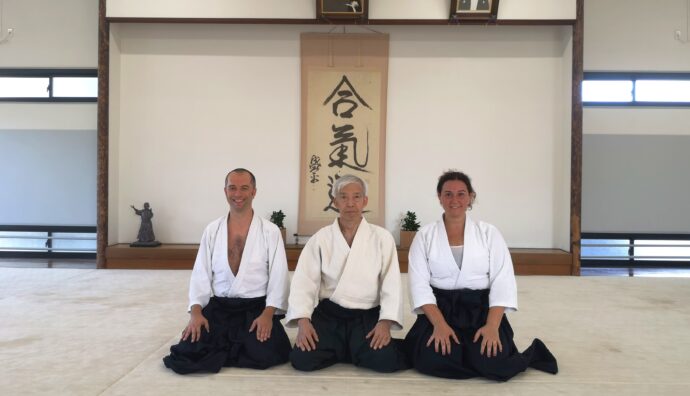On July 31st, 2023 we had the chance to train at the Hombu Dojo, in Tokyo, during our trip in Japan. Among others experienced during those week, the emotions we felt and lived changed a lot our perspective on things, especially about the discipline we practice. We dayly posted a short post about what we’ve been experiencing in Japan, yet only in Italian. A three week series of “Japanese Chronicles” We would like now to share also with our friends from other Countries our memories of the day we met the Doshu.
This morning the alarm didn’t ring.
In fact, shortly after 4AM we were already awake. Maybe it’s the emotion, maybe because of the jet lag… Here we are getting ready at the first light of dawn for our visit to the Hombu Dojo.
The Aikikai headquarter is a small building in a residential area of Shinjuku. We arrive at 5.30: it is still closed but there are already two gentlemen of a certain age waiting quietly.
We say hello, exchange a few words, and they offer us some candies. In a very simple way, we introduce ourselves into a practice group that we perceive to be very large and with very solid experience.
Around 5.50 O’Sensei’s great-grandson opens the door, so we complete the registration and go to the locker rooms.
The rooms are small, clean, spartan. There are several lockers and a single chair, which is intended for a very elderly practitioner who has a belt so worn that it has only a few dark threads above the light cotton.
At 6 we are on the tatami, it is already oppressively hot but the summers of recent years in Turin have accustomed us to training beyond any reasonable sweating threshold.
The atmosphere is very friendly. Many senpai ask us in English where we are from. When we answer them in their language, their faces break into broad smiles and friendliness becomes a sincere welcome.
On the tatami we chat, we smile, like in any Dojo, with that hint of camaraderie that is also a pleasure at six in the morning.
Ten minutes before the arrival of the Doshu, the group compacts, a silence full of concentration fills the room and we are already in line.
There are about seventy people, on a 15 by 14 meter tatami.
O’Sensei’s nephew finally arrives and keiko starts.
Moriteru Ueshiba immediately looks to be an attentive and kind individual. The training rhytm is high, techniques are shown twice on each side and then restless practice starts straight away.
The Doshu walks around the tatami and interrupts the practice of the couples to whom he wants to stress some aspects.
The techniques are a very interesting progression on kata dori menuchi and, heat aside, we make it, mentally and physically.
Finally, at the end of the class, the Doshu approaches and, with the courtesy of a perfect host, asks us who we are, where we come from, where we practice, how long we will be in Tokyo…
Thus one of the reasons why we had been planning this trip for some years takes shape for us.
We know that verbal communication is only 7% of communication itself. If we managed to practice calmly in front of Doshu and his senior students, we owe it to those who taught us to communicate through Aikido. We are very grateful to our teacher for this, as well as to our friends in the Hara Kai Dojo, with whom we practice this language.
At the same time, being able to speak in Japanese, although with our limits, allows for interaction on a deeper level, gaining respect, if not familiarity with the people we are meeting in this experience.
We are therefore infinitely grateful to the Sakura Association of Turin, which with competence and patience gave us the tools to understand and be understood.
Thanks to all this, at the end of the training Doshu honored us with a souvenir picture with him.
An unexpected gift. But Aikido is, mainly, the art of surprising and recognizing when this magic happens.

